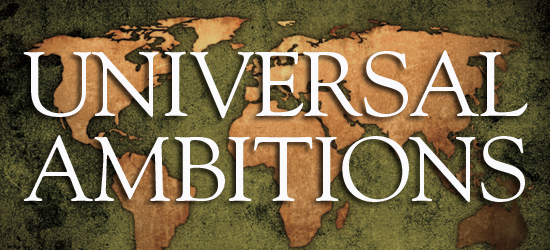
GW faculty members at the forefront of international and comparative law
By GW Law School magazine staff
The law is evolving and adapting to address our increasingly interdependent world. From litigating war crime cases, to researching foreign judicial systems, to focusing on a human rights-based approach to environmental protection, GW’s international and comparative law faculty is leading the change. This article is the first of a series to focus on faculty members whose progressive ideas and work are making a global impact.
Ralph Steinhardt

|
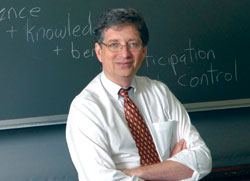
For more than 25 years, Professor Ralph Steinhardt has represented pro bono the tortured and abused in international human rights cases in U.S. courts, including the U.S. Supreme Court. He also is the founder of GW Law’s first summer program abroad with Oxford University.
Jessica McConnell
|
After more than two decades of researching, teaching, and practicing international law, Ralph Steinhardt says he is still captivated by the unique challenges of the field.
“[T]he law is exciting because it combines ‘roots’ with ‘wings’: A lawyer who isn’t grounded in doctrine and practice is virtually useless, but the law regularly rewards flights of intuition and creativity,” he explains. “With any luck, my students get a sense of the law’s arithmetic as well as its jazz.”
Steinhardt, who joined the GW faculty in 1986, brings this sense of balance to his extensive pro bono litigation work and his commitment to advancing GW’s international law program on campus and around the globe.
In 1994, Steinhardt, who earned his JD from Harvard University, founded GW Law School’s first summer program abroad with Oxford University. The program, which specializes in international human rights law, continues to thrive. With over a thousand graduates, it touts a high-profile faculty, including Yale Law School Dean Harold Koh and Richard Goldstone, the first prosecutor at the Yugoslav and Rwandan war crimes tribunals. Steinhardt says he is especially proud of the project because it has provided a laboratory for new and cutting-edge courses, paving the way for such classes as the international rights of women, human rights and terrorism, and corporate social responsibility. It also balances good theory with good practice in a sometimes misunderstood field, he adds.
Outside of the classroom, Steinhardt has dedicated nearly 25 years to litigating international human rights cases pro bono in U.S. courts, including before the U.S. Supreme Court. He has represented the survivors of torture and other abuses, most notably taking on cases against former President Ferdinand Marcos of the Philippines. In 1997, Steinhardt was the founding chair of the Center for Justice and Accountability, a nongovernmental organization based in San Francisco that specializes in assuring that the United States does not become a safe haven for human rights abusers. Deeply interested in the relationship between international and domestic law, he wrote one of the first casebooks on international civil litigation, which has been used at Yale, Georgetown, Michigan, and the University of Pennsylvania law schools, among others.
Today the amateur jazz pianist, who has “been told too many times by too many strangers” that he looks like Bill Gates, focuses his scholarship on corporate responsibility for human rights violations. Steinhardt was recently appointed as the only American citizen on a panel of experts convened by the International Commission of Jurists in Geneva, and he has served as an expert witness in a number of civil cases alleging corporate complicity in human rights violations. He is struck by the extent to which companies are voluntarily taking on human rights standards.
“It’s almost as though these companies have engaged in a kind of ‘human rights entrepreneurialism,’ competing with one another for consumers or investors by proclaiming a commitment to human rights standards,” Steinhardt says. “I’ve been making the argument lately that this is analogous to the medieval and renaissance lex mercatoria—a body of commercial practices, developed by the merchant class itself, that eventually morphed into some of the most well-established doctrines of modern commercial law and best practices.”
It is this kind of thirst to share ideas and knowledge that allows Steinhardt, a father of two, to thrive as a GW Law School professor.
“I think of the classroom as borderline sacred space,” he says. “It’s certainly not solemn, at least not all the time, but the transaction that goes on in the room and inside the minds of student and teacher alike seems to me one of the most powerful forces of nature and one of the few we can actually affect.”
Dinah Shelton
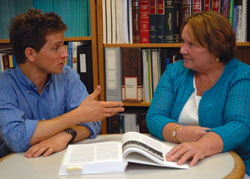
Professor Dinah Shelton is being honored with the prestigious 2007 Elisabeth Haub Prize for Environmental Law. Her current research focuses on a human rights-based approach to environmental protection.
Jessica McConnell
|

|
Dinah Shelton learned at a young age that she should strive to make a difference.
“My father never asked, ‘How was your day today?’” explains Shelton. “He would say, ‘What did you do today for the good of the world?’”
So Shelton set out to work hard and help others, becoming a leader in international human rights law, a champion of environmental causes, and a model woman researcher and scholar in a male-dominated field.
Shelton says her inspiration stems from the challenge.
“I love the scholarly puzzle of identifying a problem, thinking it through, and putting solutions into place,” she says.
A GW faculty member since 2004, Shelton has researched and taught about international human rights issues for more than 30 years. Her bustling career, in which she has logged 800,000 travel miles on one airline alone, was sparked by her junior year abroad at Edinburgh University, she says. It was then that she became engrossed in reports that Ian Smith, then prime minister of Rhodesia, promoted independence under a white-minority government and sanctioned apartheid in the African country. Shelton spoke out against the move and helped found the university’s Anti-Apartheid Society. Since then, she has never looked back. With energy and commitment, Shelton has made numerous strides in the human rights law field, earning prominent accolades along the way.
Shelton was recently selected by the jury of the Elisabeth Haub Prize for Environmental Law to receive the 2007 award. The prestigious honor, considered the pinnacle of recognition in the field, has been given annually since 1973. Shelton is the fourth American and only the second woman to receive it. She will be presented with it in Brussels later this year.
Before joining GW Law School, Shelton served on the full-time faculties of two other law schools and was a visiting professor at five others, including her alma mater UC-Berkley, and universities in Paris and Strasbourg, France. She has earned two coveted awards for her written work, including the 1982 Inter-American Bar Association Book Prize for Protecting Human Rights in the Americas (N.P. Engel, 1982, co-authored by GW Law Professor Emeritus Thomas Buergenthal) and the 2000 Certificate of Merit from the American Society of International Law for Remedies in International Human Rights Law (Oxford University Press, 1999).
Today Shelton’s research is focused on a human rights-based approach to environmental protection. She is examining whether reframing the dire needs of the environment as a threat to human rights will make the issue a higher priority. Her expertise is also guiding GW Law students in the creation and maintenance of the International Law in Domestic Courts Journal, an online database published by Oxford University Press that tracks domestic cases around the world and posts commentaries on why the cases are important to the development and application of international law. Shelton is the faculty adviser for the U.S. reporting, which was launched this spring.
Beyond her role in academia, Shelton has served as a legal consultant to the United Nations Environment Programme, UNITAR, the World Health Organization, the European Union Council of Europe, and the Organization of American States.
Despite her diverse opportunities, Shelton prefers to remain grounded in the classroom. She says she is most proud of the accomplishments of her students—some of whom are professors, State Department officials, and nongovernmental organization leaders. International law, she adds, will play an even larger role in years to come.
“The world has become so interdependent now,” Shelton says. “It’s really essential that all of our students get exposure to international law. There is not one legal practice that doesn’t benefit from and require some knowledge of it.”
David Fontana

|
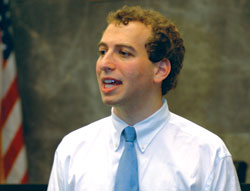
One of the newest faculty members, Professor David Fontana says his passions are constitutional law and comparative constitutional law.
Jessica McConnell
|
Just two years after graduating from Yale Law School, David Fontana is creating his own classroom path with a unique perspective on learning.
He listens as much as he talks, he says.
“Being right out of school, I can very much relate to students and their expectations,” says Fontana, who joined GW Law School’s faculty in fall 2006. “I think recognizing where students are coming from is a key to being a good teacher.”
At GW, Fontana is focused on constitutional law and comparative constitutional law, his legal scholar passions. A prolific writer, Fontana has delved into his interests by penning essays in major general interest publications, such as The New Republic Online, Legal Affairs, and the Los Angeles Times, as well as in law publications, including the UCLA Law Review and the Georgetown Law Journal. He has commented on everything from Tony Blair’s legacy, to the Supreme Court’s decision in Hamdan v. Rumsfeld, to presidential power in England and America. Fontana explains that being able to compare and contrast different legal systems helps advance debates on which measures work and which don’t.
“I was drawn to constitutional law because it tackles fundamental, important issues in a very reasonable, comprehensive way,” he says. “Law, for me, seems to be the perfect combination of theory and practice.”
Fontana, who lived with his family in England for a year when growing up, is drawing on his childhood interests in the country’s governing system for his current research. Today he is exploring the “government in opposition” system set up in other countries, such as England, that permits the opposition party formal “shadowing” rights and entitlement to information from major cabinet officials, such as the secretary of state. His work dissects how such an arrangement would fit into America’s system and whether it would succeed.
With a degree in government and foreign affairs from the University of Virginia, the upstate New York native says he was always attracted to the lifestyle of a university professor, which abounds with creativity, freedom, and “the ability to think.” The position seems to run in his family. Both of his parents are professors (his mother teaches social work at Florida Memorial College, his father is a sociology professor at Broward Community College in Ft. Lauderdale), and his sister and brother-in-law are professors of medicine at the University of Florida.
To Fontana, continual learning is essential, and it holds true when he’s in the classroom today.
“I’ve always wanted to do something practical but think about it in a big-picture way,” he says. “This became a natural fit.”
Along with his professorship, Fontana is currently completing a doctoral degree in socio-legal studies at Oxford University. Even with his worldly interests, Fontana says Washington is where he belongs.
“So many people here have the same interests, and it’s not just my Law School colleagues,” Fontana says. “Washington has a great cross section of practitioners and thinkers.”
Sean Murphy
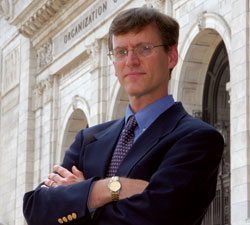
Professor Sean Murphy appears before international courts and tribunals on a regular basis. His work has been on behalf of a number of nations, including the United States, Ethiopia, and Suriname.
Jessica McConnell
|

|
In 11 years as an attorney at the U.S. Department of State Office of the Legal Adviser, Sean Murphy frequently appeared in international forums, such as the International Court of Justice and the Iran-U.S. Claims Tribunal. While the extent of Murphy’s involvement with litigation around the world may have slowed since joining the GW Law faculty in 1998, he is by no means content to focus only on his classroom teaching. He continues to eagerly field requests for his involvement in the international legal arena.
Recently, the U.S. State Department invited Murphy to defend against a case brought before the ICJ concerning U.S. attacks on three Iranian oil platforms in the Persian Gulf. The U.S. team, which also included GW Law Visiting Research Professor Michael J. Matheson, convinced the ICJ to reject Iran’s case on its merits. Murphy says that continuing with such litigation has been enriching for his scholarly writings and classroom teaching.
“It’s terrific seeing international law in action—the law becomes much more alive and illuminated when you see it making a difference in real-world cases,” he says. “I think it grounds my scholarship in reality and provides interesting examples and stories for students seeking to understand the field.”
Murphy’s work on the international stage is not limited to service to the United States. He is active in representing other governments before international courts and tribunals, as in a December 2006 case in which he represented Suriname in a maritime boundary dispute before an arbitral panel convened under the 1982 U.N. Convention on the Law of the Sea. A three-week hearing was held just blocks from Murphy’s GW office, at the headquarters of the Organization of American States. A decision is expected in the case sometime later this year.
Since 2001, Murphy also has represented the government of Ethiopia in a series of arbitrations before the Eritrea-Ethiopia Claims Commission. The commission, which sits in The Hague, was established for the purpose of hearing claims brought by Eritrea or Ethiopia against the other for violations of the laws of war stemming from their conflict from 1998 to 2000. Murphy has assisted Ethiopia in filing briefs and arguing at commission hearings on a wide range of issues, including abuses of prisoners of war and civilian detainees, wrongful expulsion of nationals, and unlawful targeting of civilians and their property. He has helped Ethiopia prove that it was Eritrea that first attacked in violation of the U.N. Charter, thus sparking the two-year war.
Murphy looks forward to continued involvement in international litigation, though only in balance with his teaching.
“One of the key benefits of international litigation is that it helps build relationships between our law school and foreign governments, and it provides unique opportunities for our students. To use Ethiopia as an example, I’ve traveled there and met with professors and students at the Addis Law School, and in turn GW law students have engaged in research and writing for Ethiopia, both through our human rights clinic and as an extracurricular project.”
Murphy adds that GW students have attended hearings of the commission in The Hague and in one instance lived in Ethiopia for a year after graduation to gather evidence for the cases. By offering such direct involvement to students, Murphy notes that “International legal education at GW is not just a classroom experience.”
Arturo Carrillo

|
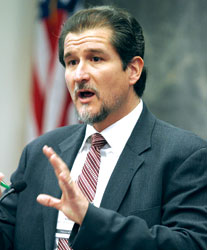
Professor Arturo Carrillo, a native of Colombia, is the founder and director of the Law School’s International Human Rights Clinic.
Abdul El-Tayef, WPPI
|
Arturo Carrillo has dedicated his career to the pursuit of justice, human rights, and the rule of law. A native of Colombia raised and educated in the United States, Carrillo, JD ’91, worked for the United Nations in El Salvador and with human rights organizations in Colombia before entering academia full time in 2000. He joined the Human Rights Institute of Columbia Law School as a senior fellow and lecturer in law before taking over the CLS Human Rights Clinic as acting director in 2002-03.
Human rights and international law form the bedrock of Carrillo’s scholarship. He has practiced and taught human rights law in the United States and abroad for 15 years, and he continues to dedicate the majority of his teaching to the field. His most recent publications have been in the area of transitional justice, and he continues to research and write on related subjects, in particular that of reparations. Since 2005, he has been a senior adviser to USAID’s Human Rights Program in Colombia, the second-largest such program in the world after the one in Iraq. Carrillo also now directs GW Law’s International Human Rights Clinic, which he founded in 2004.
In tune with Carrillo’s vision and experience, the IHRC offers GW Law students a combination of classroom instruction and clinical simulation. In the clinic, theory and practice are bridged as students work with experienced attorneys at organizations engaged in domestic or international litigation to provide pro bono legal services for victims of human rights abuses. Students work on case projects that address a wide range of contemporary issues in the human rights field, and in some cases they represent clients directly in litigation or other advocacy.
In February, the clinic submitted an amicus curiae brief to the Chilean Supreme Court on behalf of 20 U.S. law professors in support of Peru’s 2005 extradition request against former President Alberto Fujimori, who was sought to face corruption charges and indictments for serious human rights violations in the Barrios Altos massacre and the disappearances at La Cantuta.
In June, a senior pros-ecutor from Chile’s attorney general’s office charged with overseeing cases in the Chilean Supreme Court issued a formal opinion in which she recommended that Fujimori be extradited to Peru. The prosecutor presented arguments in her report that closely tracked those in the GW clinic amicus curiae brief, and legal commentators in Peru and Chile familiar with the case credit the GW clinic amicus brief with contributing substantially to this legal decision.
“The idea behind the brief was to contribute an international law perspective on ex-President Fujimori’s liability for international crimes and serious human rights violations,” Carrillo says. “We wanted
to make sure that the court took into account its international duty to ensure that Fujimori be brought to justice for his crimes.”
Carrillo says the IHRC will continue to develop groundbreaking litigation in the United States and before international human rights bodies, always with a view to promoting greater protection for victims of human rights violations and increasing respect for human rights standards everywhere.
|